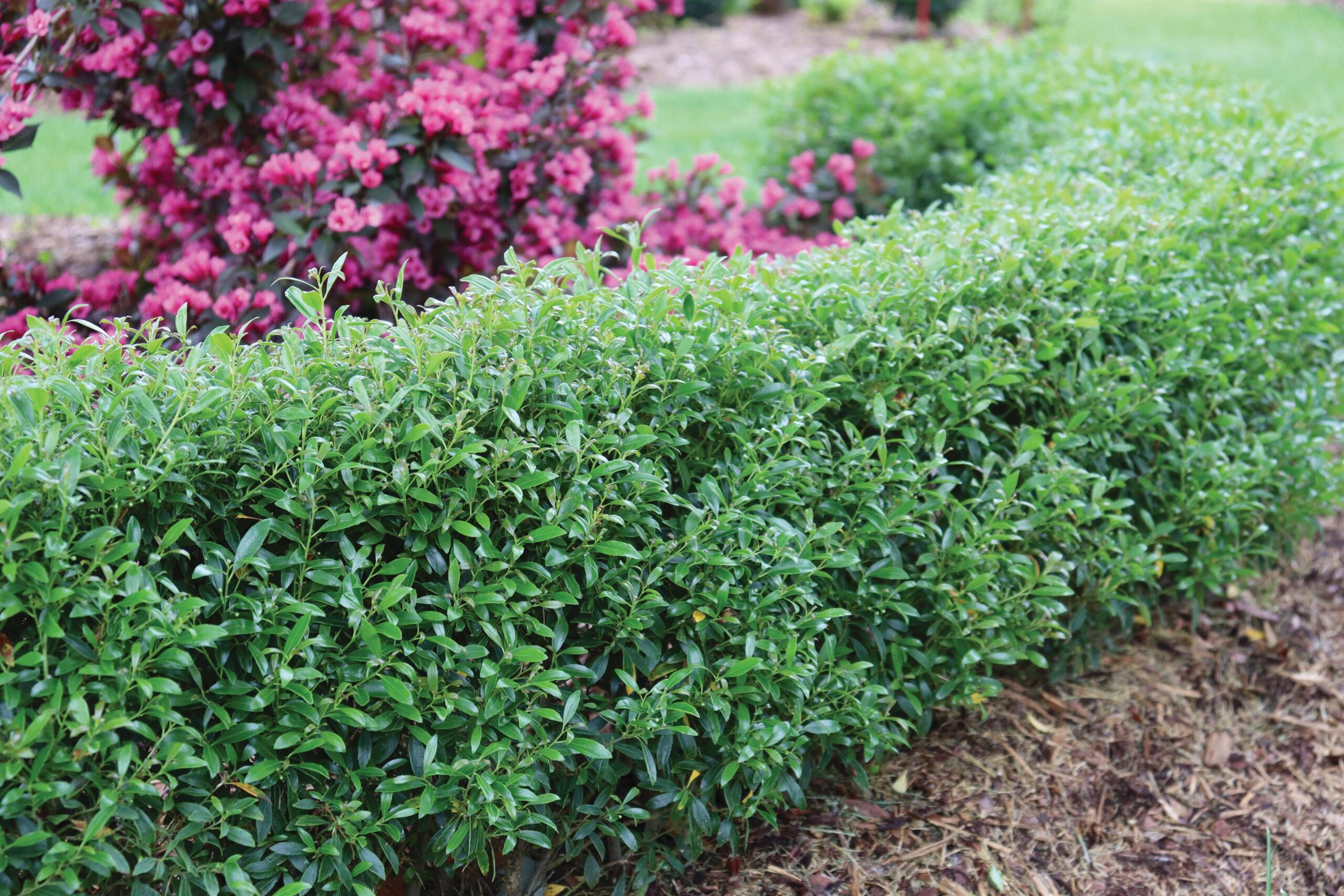On the West Coast, boxwood is still the most popular hedging plant, but more and more gardeners are looking to evergreen alternatives that don’t face the same pest and disease issues as boxwood.
Peter Eastman, tree and shrub buyer at Al’s Garden & Home, a retail nursery with locations in Sherwood, Gresham, Woodburn and Wilsonville, said boxwoods continue to be the company’s number one selling broadleaf evergreen plant, but there are some good alternatives to offer. He said they’re still popular in the landscaping industry in Oregon as opposed to other parts of the U.S. where landscapers have given up on boxwood entirely.
“Growers are starting to come up with alternatives that look close to boxwood,” Eastman said.
Stacey Hirvela, marketing manager at Spring Meadow Nursery, a wholesale nursery in Grand Haven, Michigan, and Proven Winners (one of the nursery’s brands), said her nursery has been seeing the trend toward boxwood alternatives for years.
In 2017, Spring Meadow Nursery started working on different species and varieties that resemble boxwoods to specifically position as boxwood alternatives.
“Now boxwood tree moth is more of an issue so there’s even more of a spotlight on it,” Hirvela said.
“There are few that are quite as deer resistant and shade resistant as boxwood,” Hirvela said.
Ryan McEnaney, marketing and communications manager for Bailey Nurseries, a wholesale nursery based in Saint Paul, Minnesota with operations in Dayton and Yamhill, Oregon, said one of Bailey’s developments was a variety of Distylium, with its evergreen foliage that is disease resistant.
“It’s an evergreen species with the same or similar leaf color and shape as you would experience with boxwood, so if you’re looking for that one-to-one replacement, it is a species that does really well,” McEnaney said. “When we introduced it we called it the best plant you’ve never heard of because it was underutilized, so it’s great to be able to celebrate it as a boxwood alternative.”
Bailey Nurseries First Editions® Distylium includes the Linebacker™ Distylium, known to be upright and hedge-forming; Swing Low® Distylium is a low-growing evergreen and Vintage Jade Distylium forms a mid-size mounding hedge.
McConnell at Monrovia said the classic boxwood alternative she’s been seeing in the industry is Japanese holly.
“Japanese holly looks so similar to boxwood that people have trouble telling them apart,” McConnell said. “They stay greener in the winter and perform better in the southeastern U.S.”
They’re are not as cold hardy as boxwoods but they perform well in zones 6–7. Monrovia introduced some new more compact varieties, including the Luxus® Compact Japanese Holly.
“The Luxus only reaches two feet wide and tall so it’s a great replacement for the dwarf English boxwood and a great option for a small hedge,” McConnell said. “You can shear them into shapes or leave them more natural.”
Monrovia also has some other exclusives it has been developing. LittleOne® Blue Holly is a female plant, so planting it near a male will result in red berries in the fall. It gets to two to three feet and is hardy in zone 5.
Nordic™ Inkberry is very hardy to zone 3 and is popular on the East Coast, McConnell said.
Another Monrovia exclusive is the Orangena™ Vaccinium with small evergreen leaves that hold an orange red hue and can take to rocky soils.
Eastman said dwarf Escallonia is a popular selling broadleaf evergreen at Al’s. Compact Escallonia has compact shiny green foliage and slowly grows to about two to three feet tall and wide. It blooms with bright red flowers in the summer. “Bees love it.”
Al’s Garden & Home also sells Monrovia’s Golf Ball Pittosporum as a boxwood alternative. “It has shiny evergreen foliage, takes a lot of sun and is a perfect round ball,” Eastman said. “The only drawback is that it’s only zone 8 so in a really cold winter you might get dieback on it. I’ve gotten a lot of requests for it.”
Hebe is an evergreen shrub from New Zealand that Eastman said has tight foliage that looks like boxwood except that it has showy blooms.
“The foliage is light green to dark to variaged and burgundy red. Some are hardy and do well in winters and others are not hardy at all,” Eastman said. “It’s probably best suited to the coasts of Oregon and Washington and it is very adaptive to salt spray and sandy soil.”
The boxwood hebe is more cold tolerant and grows in a tight ball.
Eastman also mentioned the Champion and Imposter Hebes, as well as a silvery, hardy one called Red Edge, and a popular one with lavender colored flowers called Blue Mist Hebe.
Proven Winners has been selecting Inkberry holly for its boxwood habits.
“Inkberry holly is tall and rangy so we’ve been selecting for the dense look and more rounded so they look more like boxwood,” Hirvela said.
Through those selections came Gem Box® and Strongbox®, both include the term “box” in the name to associate them with the plants they’re trying to imitate. They have soft leaves and can be sheared into different shapes, Hirvela said.
“If shade is a primary consideration for someone trying to replace boxwood, one good alternative is Stonehenge Dark Druid® Yew, Hirvela said. “This one definitely has a nice rounded boxwood-like form that can be trimmed. It’s not deer resistant at all but it’s very shade tolerant.”
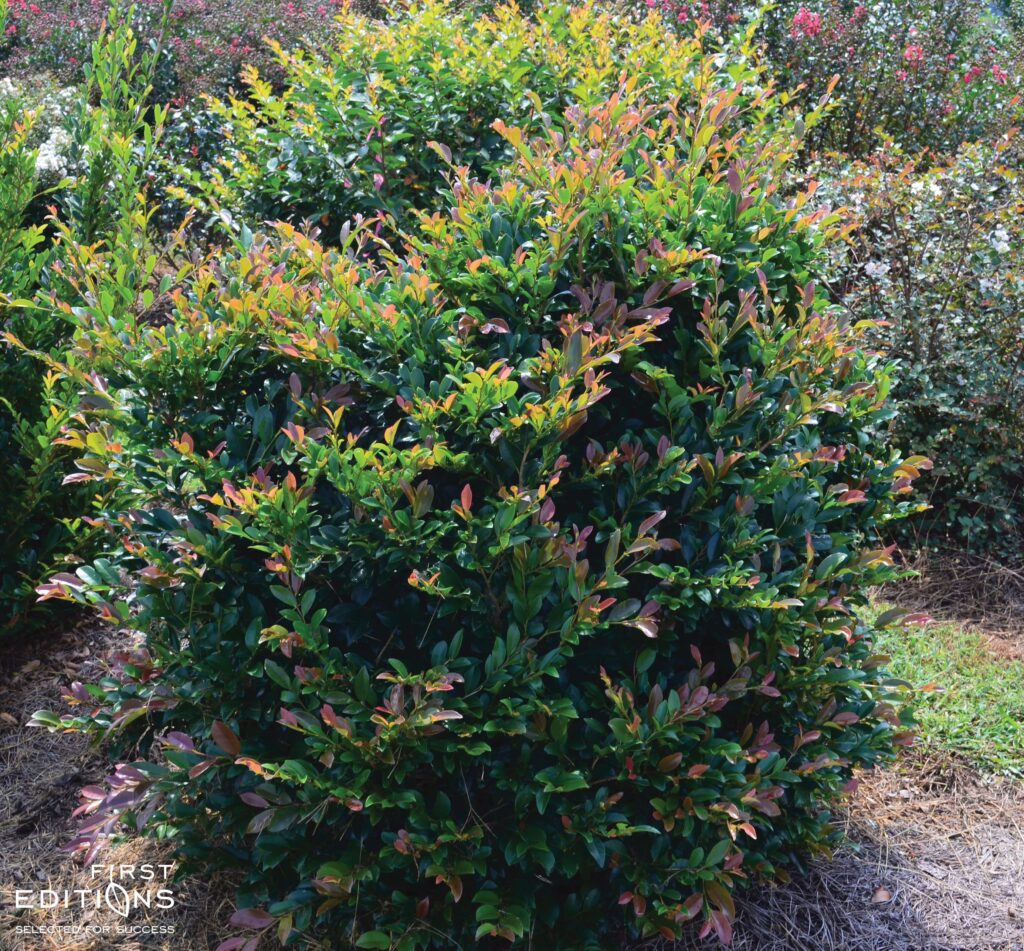
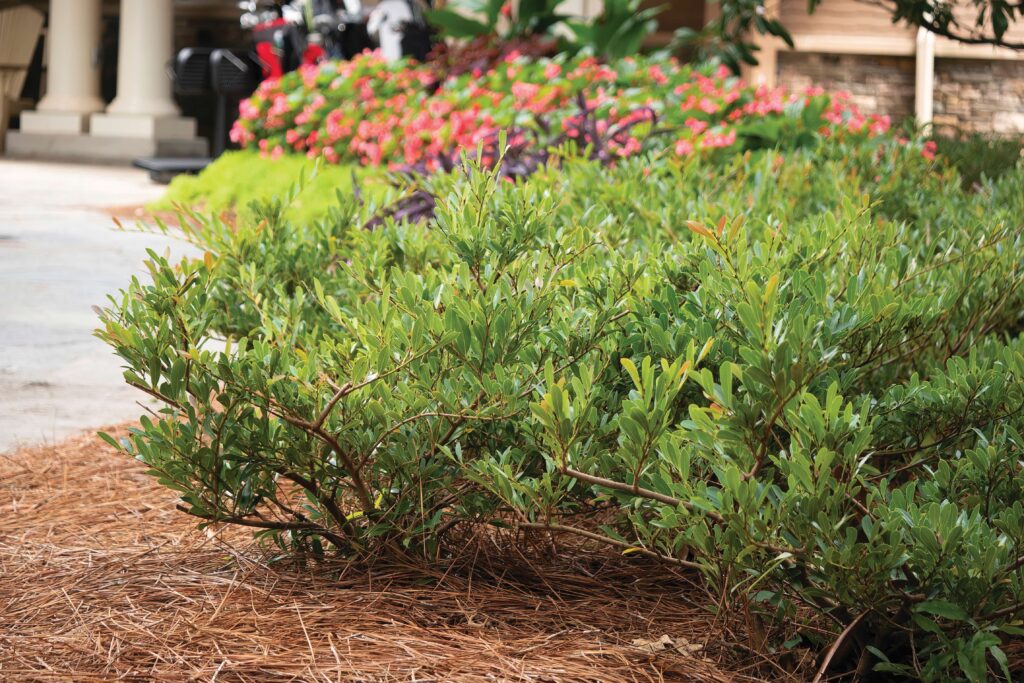
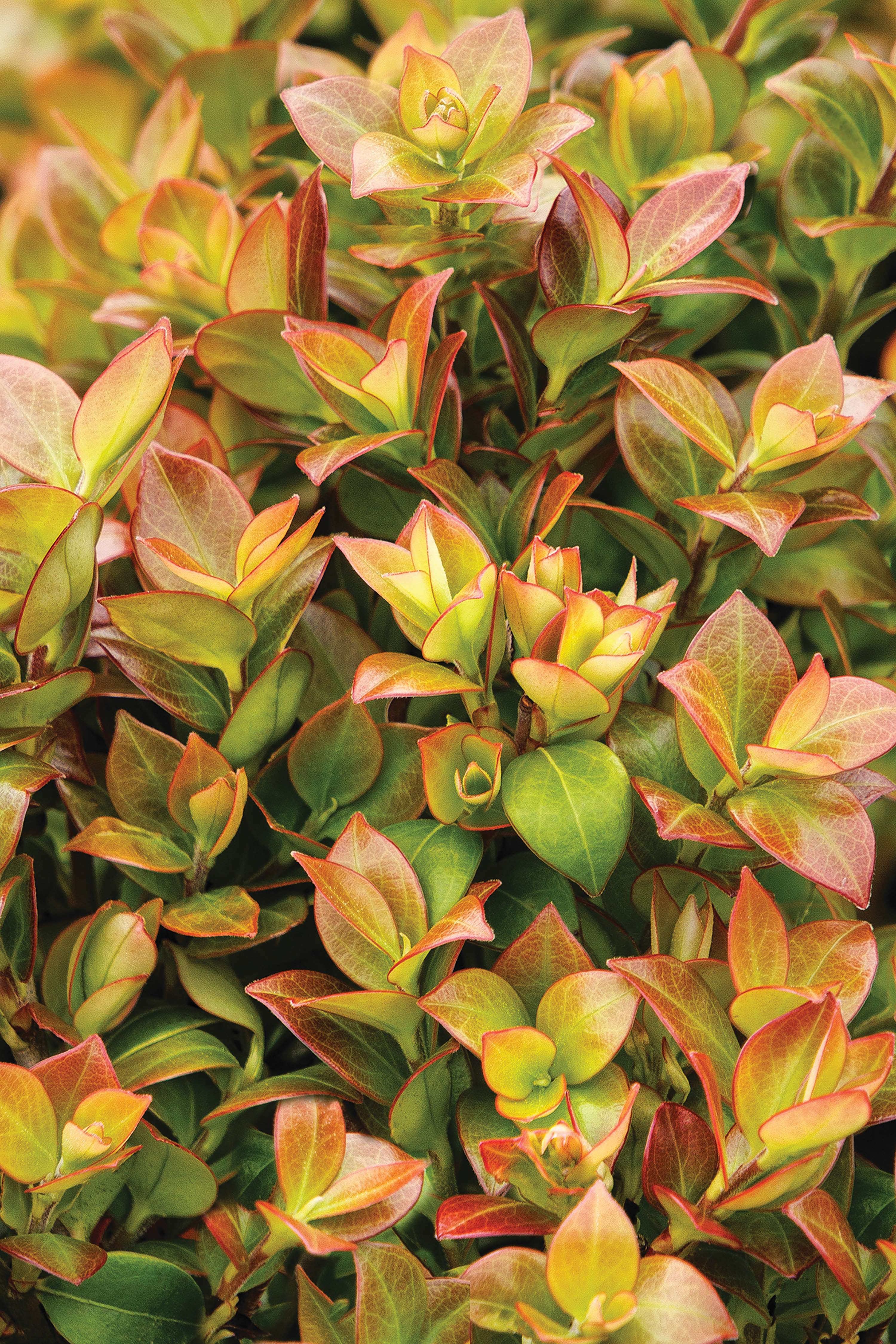
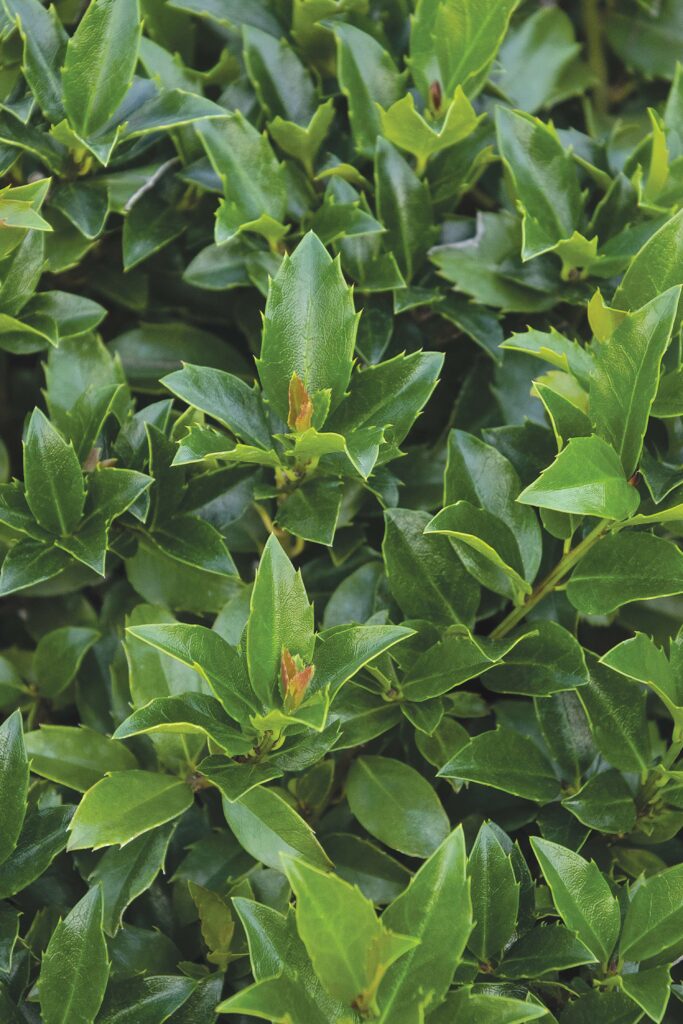
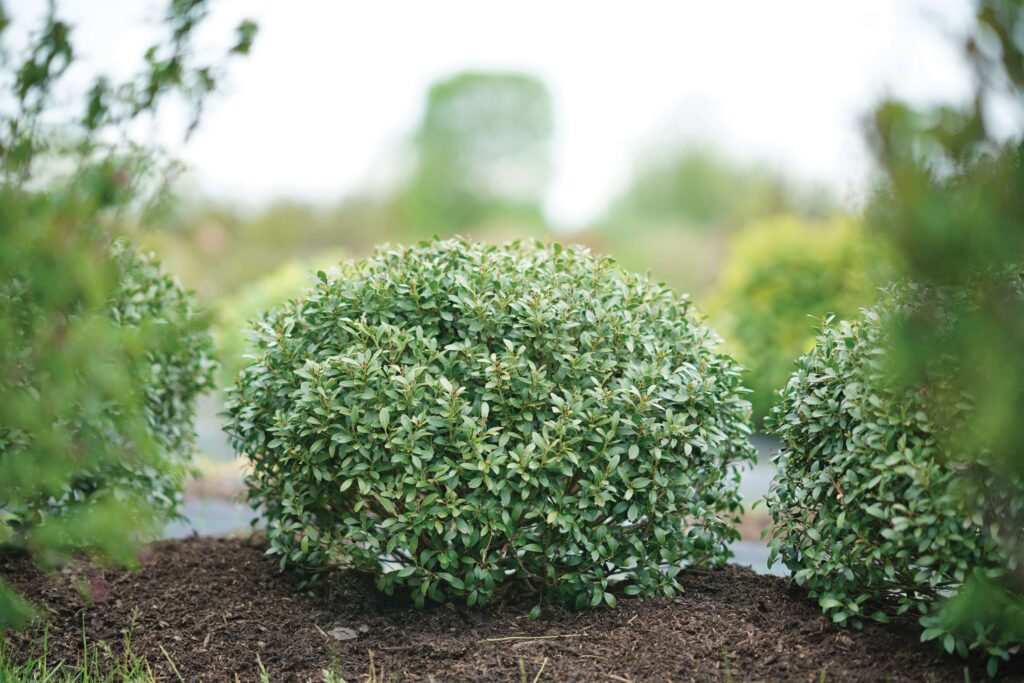
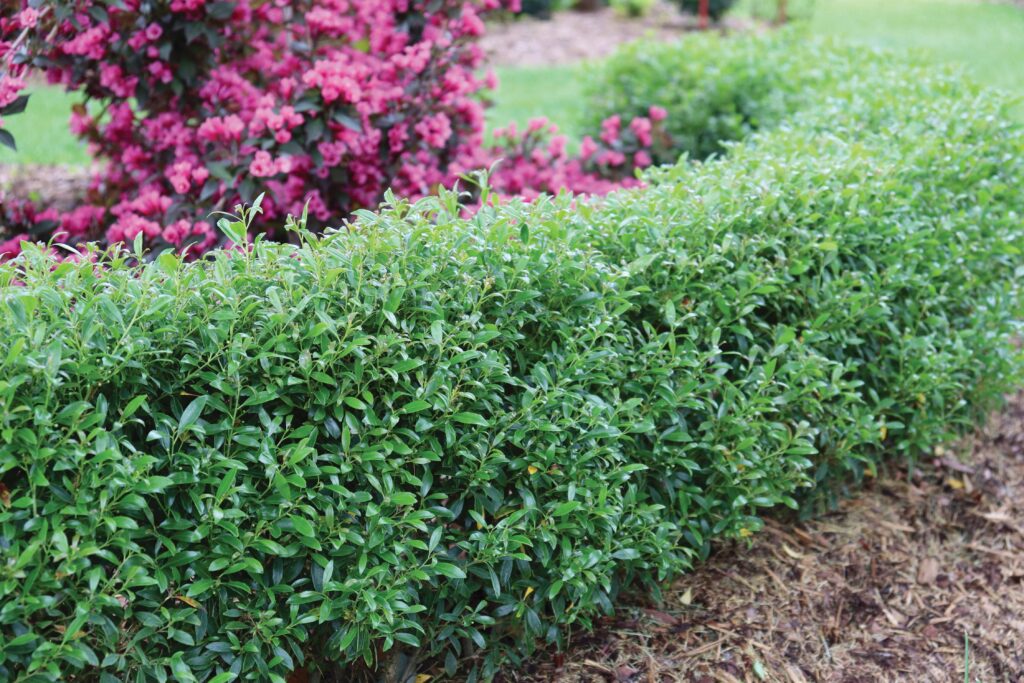
Taller stand-ins
For taller hedges, nurseries have developed several possibilities for boxwood alternatives.
Eastman of Al’s Garden & Home said if someone is looking for a hedge to grow about four to six feet tall, one of the most popular sellers is the Emerald Colonnade Holly.
“The foliage color is emerald green like a boxwood and it’s upright but still broad enough that it makes a nice hedge,” Eastman said. “Japanese holly grows well in shade like regular boxwood does.”
Another popular option is from Bailey Nurseries First Editions®. The Chubby Hubby™ Japanese Holly grows into a wide, oval shape for a five to seven foot tall hedge. Straight & Narrow® Japanese Holly becomes an upright, skinny focal point or hedge.
Another popular alternative at Al’s is Bailey Nurseries’ Chapel View™ Japanese Cedar, which grows in a mid-size pyramidal shape with unique blue-green evergreen needles and the Lucky Leu® Leucothoe is a mid-size evergreen with early season flowers.
Pink Princess Escallonia grows to six to eight feet with time and gets flowers,” Eastman said. “They’re slightly less hardy than other alternatives so it’s good for coastal communities and it’s deer resistant.”
Sweet Box grows well in shade and is very popular because it looks similar to boxwood, is easy to shear and doesn’t suffer from the same problems as boxwood.
Emerald Boxer™ Holly is a newer one that Monrovia has been testing for a long time. “That one gets a little bigger, about six feet tall, and it takes shearing well for a taller hedge and it’s disease and mite resistant,” McConnell said.
Emily Hoard is an Oregon-based freelance journalist covering business, environmental and agricultural news. She has a background in community reporting and a master’s degree in multimedia journalism. You can reach her at hoarde123@gmail.com

